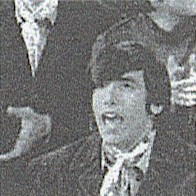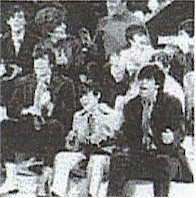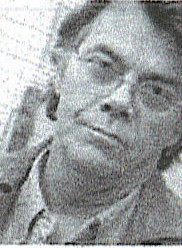|
After living through pop stardom, personal demons, and Brian Wilson, a pop legend comes to call Calgary home

Portrait of the artist as a very young man: Billy as a Cowsill
| |

Puttin' on the Ritz: the young superstars doll up for a night out
| |

In the 60s, the Cowsills performed on Ed Sullivan and The Tonight Show
| |

Cowsill left his band of brother in 1969 (photos courtesy of Bill Cowsill)
| |

Living in Calgary, Cowsill has found some peace (photo courtesy of Derek Hannah)
|
By Derek Hannah
From 1965 to lat 1970, a family group called The Cowsills had revolving claim on a substantial piece of real estate on the American pop charts. Chart toppers like “The Rain, The Park and Other Things,” (1967), “Indian Lake” (1968), their version of “Hair” (1969), as well as the theme tune to Love American Style, rendered the Cowsills inescapable for those five years. Their unique ability as players and performers captivated the imagination of teenage pop pickers from sea to sea. Like most kids at that time, elder Cowsills Bill and Bob just wanted to be The Beatles – the only difference being that they actually went out and had a go at it. The pair started out playing fab four tunes for their peers at sock-hops and local joints around Newport, Rhode Island. They so inspired their similarly gifted younger siblings that, as each of them was old enough to hold an instrument, they were instantly added to the line-up.
If anyone needed proof that the entire world loves a family act, here it was. By way of illustration of the band’s true worth, they were initially discovered by an all-black R ‘n’ B label run by Johnny (“I Can See Clearly Now”) Nash. Before they knew what end was up the toothy Cowsill kids were doing the Ed Sullivan gig in December 1967, The Tonight Show with Johnny in 1970, cutting an album a year for MGM, and turning down a TV series based on their lives (think David Cassidy and Susan Dey). Mom Barbara, a singular vocal talent in her own right, joined her six kids on stage and patriarch Bud took the reins as band manager. It was essentially the American idea of the perfect family, but with natural talent and without the big asses. However, as with most child stardom stories, it wasn’t quite the singing round the kitchen table jamboree the public would have like to believe it was. The beginning of the end for the band came when Billy, in 1969, after years of swallowing his opinion, found the strength to stand up to their heavy-handed father. That year he walked out on the group.
Today, Billy, after a circuitous and fascinating journey, resided in Calgary and is still able to summon strong feelings about that period of his life.
“I hated it,” says Cowsill. “Back in those days you were pretty much dictated to, as far as your repertoire was concerned, by A&R department of the label. You had no control.” Cowsill states with conviction that had the band been given a break from the pop-phenomenon tag, they had more than enough moxie to become a fantastic original act. But the world already had enough of that kind of band and the sun set on the Cowsill era just as dawn broke on the seventies.
There followed a hard discovery period for Cowsill, predictably accompanied by a swan dive into the world of hard drinking and drugs. Still, at last, the young artist as finding sheer joy in playing music freely and creatively in the seminal Mazeppa scene of Tulsa after years of being the musical equivalent of a battery hen.
“My odyssey really began in Tulsa, Oklahoma,” Cowsill says. “I was playing for ten bucks a night and all the whisky you could drink, but I was sitting in with Harry Nilsen, JJ Cale. I got to play with Carl Wilson. And finally I was playing with roots people, playing the kind of music I wanted to play. That’s when I really started learning.”
As it turned out, it was less his considerable playing talent than the production savvy picked up through spending his teenage years in studios that was really in demand. This allowed him backstage access to the world of the musicians he’d love and admired. He is able to relate stories from this period freely, despite the haze that doubtlessly accompanied it, and has a rare knack for putting a date to almost any event. It’s well documented that Billy Cowsill was the prime candidate to take over from Brian Wilson as lead Beach Boy during the Brian in bed years. He even had the chance to hang out with the big Beach Boy face to face at his mansion. During a stroll in the garden, Wilson suddenly turned to the young man who unbeknownst to him, worshipped him, and said, “Can I ask you something, Bill?” Frightened and flattered Bill nervously encouraged the bloated Barbara-Anne-er to speak freely. As Wilson looked Billy Cowsill in the eye he asked with dead seriousness, “Do you think there is enough bass in “I Get Around”?”
Happily, in Canada, Cowsill’s musical voyage has continued apace. A resident of Vancouver since the mid-seventies, he formed Blue Northern there in 1978 – a country-fuelled gang of moustachlead Canucks whose sole album stands as a neglected milestone in country-rock history. After a three year run criss-crossing Canada with them, Bill ended up back in Vancouver and the bar gigs that have buttered his bread over the years. In fact, music has truly been the only job this man has ever had, or as he puts it, “I’m resigned t the fact that I work for music. She’s been a hard mistress but then, I like it a little rough.”
Next came the band that appears to have provided (quite rightfully) the greatest personal satisfaction in Billy Cowsill’s life. The Blue Shadows. Again criminally undervalued by many the Shadows’ four-year, two-album career folded Beatles attitude and riffs over Everly Brothers harmonies, crossing still another beautiful epoch in country music. Sadly, the country establishment was too narrow of mind to accept anything smelling remotely of crossover and the pop world was frustratingly suspicious of anything country. Cowsill talks of their demise with genuine regret but is not above laughing about it. “I mean, three vegetarians and a junkie, what are the chances of that lasting?” he quips.
Musically Cowsill has stayed refreshingly true to the influences of his youth, steering well clear of the embarrassing middle-age re-inventions that many mature stars resort to. If you happen to catch Billy in concert today odds are two to one that he’ll be knocking you back in your seat with a tune by Merle Haggard, Roy Orbison, Church Berry, Patsy Cline, The Beatles, Del Shannon, or something produced by Phil Spector. We’ve come to value the singer/songwriter categorically and comprehensively above those who sing the songs of others despite the fact that, with a number of notable exceptions, few people do both very well. Billy Cowsill sings very well – try and hold the fact that he’s singing covers as a yardstick of quality against this guy, and you’ll look a fool.
“I like other people’s mater better than my own,” Cowsill says, “I’d rather sing a good cover of a classic song than a bad cover of one of my own any time.” And how can you argue? How can you protect above the sound of that voice, curved out of steel and ebony, equally at home in a blue whisper or a larynx-ripping roar. The perfectionist and studio-sergeant in shines through. He adds, “I mean, if I can’t have (my songs) the way I spent months getting them. If I can’t have Jeffrey Hatcher (Blue Shadows) or my brothers singing beside me on those songs I just don’t wanna sing ‘em.”
A full-time, clean-livin’ university student of English, Cowsill plays only when asked these days – and then only at smaller venues, usually Kaos Café or Karma. Those lucky enough to catch him drawn by either his solid live reputation or perhaps ghoulish curiosity at seeing that family name on a poster, are summarily blown away. Each performance is delivered with the kind of pure, unabridged guts and string-breaking soul so often absent in low-key gigs of this kind. The lone, lanky figure drives away from each gig in his battered Dodge taking the crowd in his ass pocket without fail. The road and the miles have polished a natural talent to a high glass and Billy Cowsill, held against even the best of his local peers, exudes an unmistakable star quality. Accompanied by local hero Steve Pineo and ace bassist Tim Leacock, he has yet again assembled a perfectionist’s dream band in The Co-Dependents, and they’ve quickly garnered a sizable following. Yet ironically, for one who grew up on stage, Cowsill has lived his life detesting the limelight, even going so far as making a policy of occupying side stage at every show.
“It's never been about stardom, about making millions,” he says. I've done that and it made me miserable, man. For me it's just about getting the harmonies right, it's about getting the sound down. That's all I've ever wanted to do. It's about the music, that's all there is. I'd rather die a pauper having put a sweet tune on people's lips than have the world in the bank.”
Even in the darkest days of his career, Cowsill could never be accused of turning in anything less than a heartfelt, skintight performance, and now that he has cleaned up his act personally, hope seems to sit naturally on his shoulders. He says simply that life nowadays is “good” and that he’s “working on himself.” After witnessing Billy Cowsill’s extraordinary vocal gift or spending even five minutes in his screne, yet immense, presence, you’d have a hard time wishing him anything but well.
|











